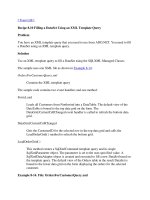IYC ppt template v100202
Bạn đang xem bản rút gọn của tài liệu. Xem và tải ngay bản đầy đủ của tài liệu tại đây (737.83 KB, 15 trang )
IYC 2011
All known matter – gas, liquid and solid – is composed of
the chemical elements or of compounds made from those
elements. Humankind’s understanding of the material
nature of our world is grounded in our knowledge of
chemistry. Indeed all living processes are controlled by
chemical reactions.
The International Union of Pure and Applied
Chemistry (IUPAC) and UNESCO strongly
believe that it is time to celebrate the
achievements of chemistry and its
contributions to the well-being of
humankind.
Background and Concept
The concept of IYC 2011 started with the recognition by
IUPAC that a number of scientific disciplines have achieved
significant benefits from securing designation by the United
Nations of an international year pertaining to their field.
The idea of holding a year of chemistry was first discussed
in 2006, during the April meeting of the IUPAC Executive
Committee.
• IUPAC Endorsement – August 2007
• UNESCO Support – April 2008
• UN Declaration – December 2008
Objectives of the International
Year of Chemistry
• Increase the public appreciation and understanding
of chemistry in meeting world needs
• Encourage interest of young people in chemistry
• Generate enthusiasm for the creative future of
chemistry
• Celebrate the role of women in chemistry and major
historical events in chemistry, including the
centenaries of Mme. Curie’s Nobel Prize
Conversation between Chemistry and Society about the future
shape of chemistry for sustainability set in the context of
chemistry’s achievements
United Nations Millennium Goals
Goal 1: Eradicate extreme poverty and hunger
Goal 2: Achieve universal primary education
Goal 3: Promote gender equality and empower women
Goal 4: Reduce child mortality
Goal 5: Improve maternal health
Goal 6: Combat HIV/AIDS, malaria and other diseases
Goal 7: Ensure environmental sustainability
Goal 8: Develop a Global Partnership for Development
CHEMISTRY is vital to achieving these goals!
Global Partners
IUPAC and UNESCO – Organizing Partners
• United Nations
• Federations of Chemical Societies
FACS, FASC, FLAQ, EuCheMS
• National Chemical Societies
• Industry
• NGOs
• Educational and Research Institutions
• Individuals
Making an Impact
• highlight the nature, beauty and relevance
–both economic and environmental– of
chemistry to the modern world
• use the media effectively to enhance the
profile of chemistry, as viewed by pupils,
the general population and politicians
• work together to achieve these goals
IYC is a chance that will not come again for
some time . . .
Cornerstone Events
Opening Ceremony
under the aegis of the UN, UNESCO, and IUPAC
Jan 27-28, 2011 – Paris, France
theme - Chemistry and the UN Millennium Goals
IUPAC World Congress - "Chemistry Bridging Innovation
among the Americas and the World"
Jul 30 - Aug 7, 2011 – San Juan, Puerto Rico
Closing Event - under the patronage of the Chemical and
Pharmaceutical Industry
Dec 1, 2011 – Brussels, Belgium
•
Opportunities for speakers and chairs at highest
levels from all sectors
Other Key Events
Pacifichem 2010 – Pre-inaugural reception publicizing
the International Year for Pacific Rim participants
Dec 15-20, 2010 – Honolulu, Hawaii, USA
Chemistry – the key to Africa’s future
Congress of the Federation of African Societies of
Chemistry (FASC)
Jan 16-21, 2011 – Johannesburg, South Africa
CHEMRAWN - Symposium on Biofuels
Sep 2011 (date tba) – Kuala Lumpur, Malaysia
Activities – some examples
• African Conference - Science, education and capacity
building challenges related to SAICM (UN’s Strategic
Approach to International Chemicals Management)
implementation. Possible Cornerstone event in Ethiopia
• Project on the science of Climate Change to support
teaching and informed policy discussion led by RSC &
ACS
• Numerous national proposals from commemorative
postage stamps, open days and specific celebrations,
for example, for Madame Curie at the Sorbonne/ L’Oreal
award for women in science
• Celebrating stories of chemistry
Activities – more examples
• Re-energising existing national/regional outreach
activities
• Social networking (facebook, YouTube) on chemistryrelated questions
• Video clips (existing and new) to promote the
contributions of chemistry
• Providing real expertise through an “ask a scientist”
program
• Educational resources – chemistry board game,
Australian chemistry quiz, videos of famous chemists,
science fair participants
• Global experiment for children
Global Experiment
•
Students around the world (elementary, secondary
and/or tertiary) measure, collect samples or data,
e.g., water samples for isotopic composition and
pH, send to a collective database
•
Topic related to IYC themes – chemistry and
sustainability ; likely focus on water supplies
IYC 2011
Our understanding of the fundamental nature of
our world is grounded in chemistry. Molecular
transformations are basic to production of foodstuffs,
medicines, fuels and materials – essentially all
manufactured and extracted products. We will rely
on this science to maintain a sustainable,
wholesome environment for all the earth.
IYC 2011 is a unique opportunity
for everyone to celebrate the
central contributions of chemistry.
Head: 28 pt Arial Bold
Subhead: 22 pt Arial Bold
Text: 20 or 22 pt Arial (depending on best copy fit)
Highlighted text should appear in cyan blue
found in the color palette within this file, or
accentuate a word or phrase using bold black,
italic text, or both
• Bulleted text: margin indent 3/8 inch (.375 in)
DRAFT ppt provided by the IYC Outreach Committee.
Please return comments, ideas, suggestions to
draft date: Feb 2, 2010









